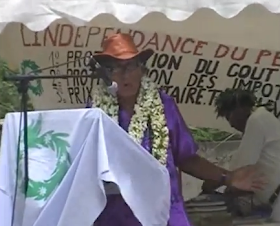French authorities in the colony of French Polynesia on January 30th arrested a Tahitian man claiming to be a Polynesian king, for issuing a phony currency. Shots were fired from within the king’s compound as police moved in, according to news accounts calling it an “alleged rebellion.” In the end, five people were arrested and three firearms were confiscated, but there were no injuries. (French Polynesia was included a month ago in this blog’s list of “10 Separatist Movements to Watch in 2014.”)
 |
| Location of French Polynesia in the Pacific |
 |
| Confiscated Polynesian funny money |
 |
| Pakumotu perp walk |
At the time of that sentence, a Pakumotu Republic spokesman reiterated his government’s June 2, 2010, declaration of independence from the French Republic. “France no longer has authority,” said the spokesman, who was present in court along with several ministers of the republic. “A state cannot judge another state.”
 |
| The king declares independence in front of the Pakumotu flag |
 |
| King Tanginui I and his daughters display what appears to be the Pakumotu royal standard— a modification of the national flag (see above), with a coat-of-arms included. |
 |
| Mahina Teiri with a banned 100-patu note |
 |
| French Polynesia’s official flag |
 |
| Self-proclaimed president of the rival Maohi Republic |
What is not yet known is whether the king’s arrest marks the end of the Pakumotu Republic. French authorities are wondering if more armed restorationists are out there, biding their time.
Related articles from this blog:
“Easter Island Wants to Split from Chile, Join French Polynesia”
“What Is a Colony? The United Nations’ Definition Needs an Overhaul”
“10 Separatist Movements to Watch in 2014”
“France’s Far Right Wants Early Vote on New Caledonia Independence—but Only Because They’re against It”
Related articles from this blog:
“Easter Island Wants to Split from Chile, Join French Polynesia”
“What Is a Colony? The United Nations’ Definition Needs an Overhaul”
“10 Separatist Movements to Watch in 2014”
“France’s Far Right Wants Early Vote on New Caledonia Independence—but Only Because They’re against It”
[For those who are wondering, yes, this blog is tied in with a forthcoming book, a sort of encyclopedic atlas to be published by Auslander and Fox under the title Let’s Split! A Complete Guide to Separatist Movements, Independence Struggles, Breakaway Republics, Rebel Provinces, Pseudostates, Puppet States, Tribal Fiefdoms, Micronations, and Do-It-Yourself Countries, from Chiapas to Chechnya and Tibet to Texas. Look for it some time in 2014. I will be keeping readers posted of further publication news.]



No comments:
Post a Comment